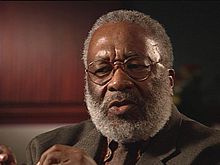Vincent Harding
| Vincent Harding | |
|---|---|
 |
|
| Born |
Vincent Gordon Harding July 25, 1931 Harlem, New York, U.S. |
| Died | May 19, 2014 (aged 82) Philadelphia, Pennsylvania, U.S. |
| Alma mater |
City College of New York (B.A.) Columbia University (M.S.) University of Chicago (M.A., Ph.D.) |
| Occupation | Historian |
| Notable work | "Beyond Vietnam: A Time to Break Silence" |
| Spouse(s) | Rosemarie Freeney Aljosie Aldrich Knight |
Vincent Gordon Harding (July 25, 1931 – May 19, 2014) was an African-American historian and a scholar of various topics with a focus on American religion and society. A social activist as well, he was perhaps best known for his work with and writings about Dr. Martin Luther King, Jr., whom Harding knew personally. Besides having authored numerous books such as There Is A River , Hope and History, and Martin Luther King: The Inconvenient Hero, he served as co-chairperson of the social unity group Veterans of Hope Project and as Professor of Religion and Social Transformation at Illiff School of Theology in Denver, Colorado.
Harding was born in Harlem, New York, and attended New York public schools, graduating from Morris High School in the Bronx in 1948. After finishing high school, he enrolled in the City College of New York, where he received a B.A. in History in 1952. The following year he graduated from Columbia University, where he earned an M.S. in Journalism. Harding served in the U.S. Army from 1953 to 1955. In 1956 he received an M.A. in History at the University of Chicago. In 1965 he received his Ph.D. in History from the University of Chicago, where he was advised by Martin E. Marty.
In 1960, Harding and his wife, Rosemarie Freeney Harding, moved to Atlanta, Georgia to participate in the Southern Freedom Movement (also known as the American Civil Rights Movement) as representatives of the Mennonite Church. The Hardings co-founded Mennonite House, an interracial voluntary service center and Movement gathering place in Atlanta. The couple traveled throughout the South in the early 1960s working as reconcilers, counselors and participants in the Movement, assisting the anti-segregation campaigns of the Southern Christian Leadership Conference (SCLC), the Student Nonviolent Coordinating Committee (SNCC) and the Congress of Racial Equality (CORE). Vincent Harding occasionally drafted speeches for Martin Luther King, including King's famous anti-Vietnam speech, "A Time to Break Silence," which King delivered on April 4, 1967, at Riverside Church in New York City, exactly a year before he was assassinated.
...
Wikipedia
